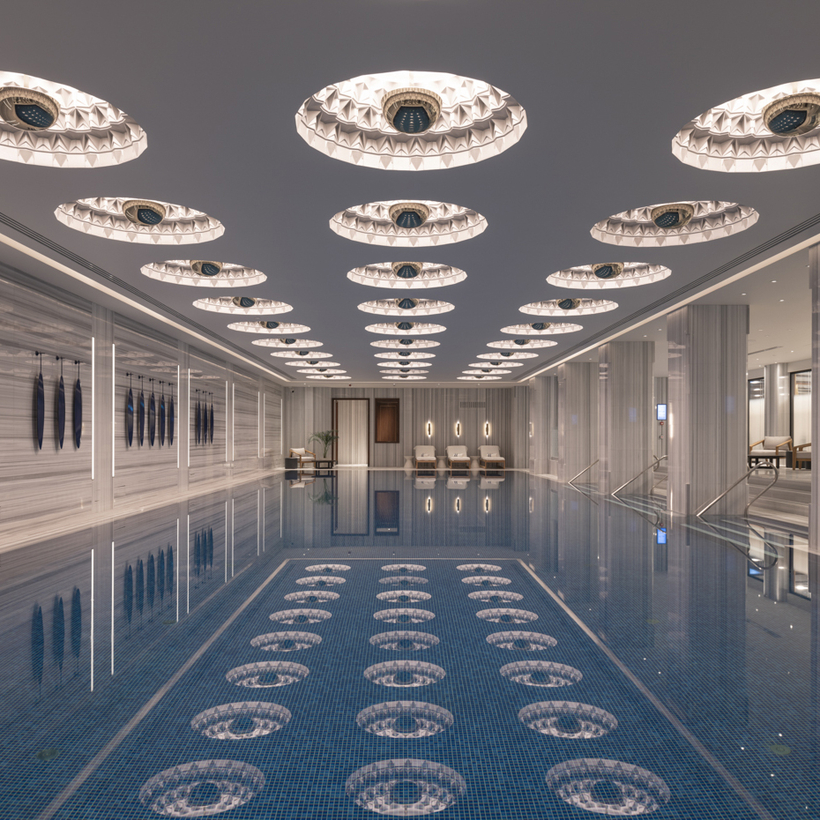Even those who never leave the premises of the new Peninsula Istanbul hotel will still have an intimate experience with Turkey’s largest city, an ancient metropolis of nearly 16 million that straddles the Bosphorus.
Under different circumstances, it takes decades to create a truly great urban hotel, such as the Ritz in Paris, Claridge’s in London, or the Carlyle in New York. Acquiring some patina is part of it, but the best big-city hotels are also local favorites, which is what gives them their style and energy.
Following a soft opening in February, it’s taken only seven months for this 138-room, 39-suite beauty to become the most stylish address in Istanbul. Why?

Start with its waterside location, on the Golden Horn, which flows into the Bosphorus in formerly gritty Karaköy. One of the oldest and most historic neighborhoods in Istanbul, it bears traces of its constant re-invention. Historically called Galata, it started as a Byzantine port before becoming a self-governing enclave for Genoese and Venetian merchants, then a refuge for Sephardic Jews fleeing Spain, an Ottoman Empire financial district, a fish market, and, now, home to the Galataport complex. Today, it’s anchored by a handsomely landscaped pedestrian promenade, a new underground cruise terminal, and the recently opened Istanbul Museum of Modern Art, designed by Renzo Piano.
The best big-city hotels are also local favorites, which is what gives them their style and energy.
The nonchalant but passionate love of Istanbulites for the waterway that defines their city is best expressed by native son and Nobel Prize–winning novelist Orhan Pamuk. In Istanbul: Memories and the City, he writes, “‘Life can’t be all that bad,’ I’d think from time to time. ‘Whatever happens, I can always take a long walk along the Bosphorus.’” He’s not wrong—this broad, briny channel teeming with ferryboats and ships traveling between the Black and Mediterranean Seas provides one of the most electrifying urban panoramas in the world.

Until now, Turkish architect Zeynep Fadillioglu was best known for designing the Şakirin Mosque, on the Asian side of the Bosphorus. But her work at the Peninsula will rival that; she renovated a 1937 Bauhaus ferry terminal into one of the world’s most beautiful public spaces. The soaring hall, with a polychrome-glass ceiling and lantern-like glass chandeliers, is both the hotel’s reception area and main restaurant, the Lobby.
Some of the Peninsula’s comfortable and beautifully decorated rooms are found in three historic mansions: one is Art Nouveau, from 1910; another, Belle Époque, from 1912. A newly constructed building contains guest rooms with private terraces. And all of this is linked together by marble-lined hallways decorated with vintage photographs by Ara Güler, the Robert Doisneau of Istanbul.

The hotel’s terrace and its rooms overlooking the Bosphorus deliver the best views in the city, which include almost all of its major monuments. Among them are Topkapi Palace, built by the Ottomans in the 1460s, and the six minarets of the 400-year-old Blue Mosque. Nearby is the magnificent Hagia Sophia, masterminded by the Byzantine emperor Justinian in the sixth century. The azure domes of the Süleymaniye Mosque can be seen in the distance.
Despite the Peninsula’s many virtues, the real reason that Istanbulites are flocking there is to dine at chef Fatih Tutak’s restaurant Gallada, which opened on July 7. Located on the roof of the Bauhaus building, its outdoor terrace is lined with 30 pomegranate trees. To make a gastronomic connection between Istanbul and the Peninsula hotel group’s hometown of Hong Kong, Tutak designed a small-plates menu on the theme of the Silk Road, a network of trade routes that linked China to Europe and the Middle East, and passed through countries known today as Kazakhstan, Uzbekistan, and Kyrgyzstan.

“It was a fascinating challenge,” says Tutak. At only 38, he’s the best-known chef in Turkey, with two Michelin stars for his first restaurant, Turk. “Gastronomic storytelling has to be honest and really lucid to work. Otherwise it becomes cloying and folkloric,” he says. He spent months researching the kitchens of the countries crossed by the Silk Road before drawing up his first menu.
Tutak was uniquely qualified to undertake this project. The Istanbul native has lived in Qingdao, Beijing, Singapore, Hong Kong, and Tokyo, where he worked with chef Seiji Yamamoto at the three-Michelin-starred Nihonryori RyuGin. He was also head chef at the Dining Room at the House on Sathorn, in Bangkok, which was named to the World’s 50 Best Restaurants list during his tenure there.

In 2019, he returned to Istanbul and raised the flag of Turkish cooking. “Our kitchen is one of the best and most varied and sophisticated in the world, but remains little known,” says Tutak. “My job now is to put it forward.”
His menu is designed to exalt the Turkish palate and show how its cosmopolitan character connects Asia to Europe. One of my favorite dishes was a savory salad of tuna and skinless cherry tomatoes in aged vinegar with yuzu, tahini, and onions. And since dumplings in one iteration or another are found in every country along the Silk Road, Tutak has mastered those as well. His succulent riff on a lamb kebab is almost like a mille-feuille, filled with paper-thin slices of lamb and pickled onions. His Peking duck and mesmerizingly light date cake with masala tea and buffalo-milk cream are equally spectacular.
Gallada is also the place to discover the excellence of Turkish wines, including the Chamlija Django from Kirklareli. This is the most expensive Cabernet Sauvignon made in Turkey, and the one Tutak gave as a gift to the oenophile French chef Yannick Alléno.

By the end of dinner service, the D.J. will be spinning Turkish and Central Asian dance music, and the crowd, a Who’s Who of Istanbul’s creative set, will order more cocktails. Their ingredients consist of apricot purée, rose jam, lemongrass cordial, Sichuan oil, tomato-tea sherbet, ginger tea, and turmeric—fuel for dancing, which makes this the best rooftop party in town.
Hiring Tutak to create such an original restaurant was a stroke of genius. It’s also yet another reason why the Peninsula Istanbul may be the most exciting new hotel opening in Europe this year.
Going places? Whether traveling abroad or exploring culture closer to home, AIR MAIL’s Arts Intel Report is our newly revamped research tool for what to do and where and when to do it
Alexander Lobrano is a Writer at Large for AIR MAIL. His latest book, the gastronomic coming-of-age story My Place at the Table: A Recipe for a Delicious Life in Paris, is out now


